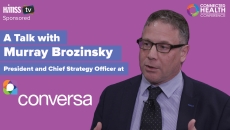Population Health
Optum calls the study's conclusions "misleading" as health systems use many data elements other than cost to select patients for clinical engagement.
Prescription opioids are a major contributor to the opioid epidemic and are linked to prescription opioid abuse, addiction and overdose deaths.
SPONSORED
Conversa Health President and Chief Strategy Officer Murray Brozinsky details how his company's population health management platform delivers better patient experience while alleviating provider burnout.
HIMSS Media editorial team members discuss the top takeways from the Connected Health Conference in Boston, including the changing role of healthcare payers, the challenges of behavior change, worrying digital health adoption stats and more.
SPONSORED
David Hancock, healthcare executive advisor at InterSystems, says issues such as fragmented care and social determinants drive the need for interoperability when delivering healthcare to populations now and in the future.
ConsejoSano's patient engagement platform targets culturally diverse populations to make healthcare more accessible to those affected by social determinants, says the organization's COO Vikram Bakhru.
The four companies settled with the two Ohio counties that had brought the lawsuit, avoiding what was expected to be a bellwether trial.
Teaching hospitals posted superior outcomes, including higher 30-day mortality rates, for patients who underwent general or vascular surgery.
Few adults have the knowledge and ability to obtain health insurance information that can impact their ability to best use their benefits.
Despite this cost increase, 95% of employers are very confident their organization will continue to sponsor healthcare benefits to active employees.





